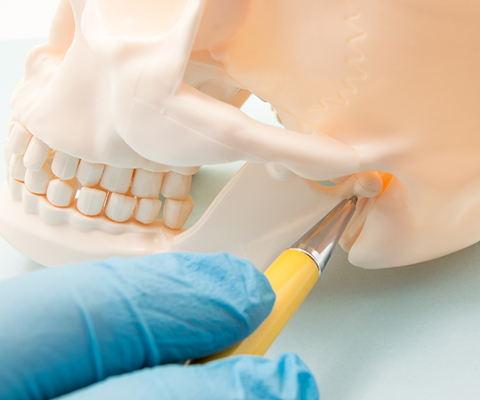TMJ & TMD

The jaw joint is a complex and active joint, and the constant motion involved in eating, drinking, and speaking can cause strain over time. Repeated and prolonged episodes of strain or trauma can cause a disorder to develop that affects the movement of the jaw.
While this type of oral health problem is not purely dental in nature, we can continue to offer support and treatment when the disorder affects essential dental functions. We may work in collaboration with other healthcare providers to help manage your condition.
What is TMJ?
The temporomandibular joint (TMJ) connects the jawbone to the base of your skull, allowing the joint to slide and rotate. There are two joints; one on each side of the jaw to connect it to the skull. These joints are essential to various oral functions, as these aid muscles that control movements in the jaw.
What is TMD?
Temporomandibular disorders (TMD) occur when there is a problem or dysfunction with the jaw joint (TMJ). Some signs of TMD can be ear/jaw pain, restricted opening of your mouth or clicking and popping sounds when opening and closing.
The exact cause of TMD may not always be clear, and symptoms of TMD can be observed from both the joint and the muscles attached to it. The latest research cites a combination of factors, such as rheumatoid arthritis and osteoarthritis, previous trauma to the jaw, and some genetic risk factors which may influence TMD. Health professionals have also looked at bruxism — the clenching and grinding of the teeth — as an associated factor, although not all patients who have bruxism experience TMD.
Symptoms of TMD
Patients with TMD often experience pain and discomfort of the jaw, muscles and ear, and these can be temporary or last over a period of several years. It can also affect either just one or both sides of the face.
- Pain or tenderness in the jaw and surrounding structures
- Locking of the jaw when the mouth is opened or closed
- Clicking or popping sounds from the jaw joint
- Persistent headache, dizziness, ear pain, and ringing in the ears
- An uncomfortable bite
- Toothache, sore teeth and tired facial muscles
- Swelling from the side of the face
To confirm if you are experiencing TMD, a physical examination is required as these symptoms can mimic a number of other dental conditions. It’s important to seek medical attention right away if you are experiencing persistent pain or if you notice a worrying change in your condition. Be sure to seek immediate medical attention if your jaw does not open or close completely.
How to Relieve Pain Caused by TMD
It is important to follow the post-treatment instructions recommended following your appointment to help manage your pain, as these are customized to your particular condition. Some additional ways to ease pain TMD pain can include:
Soft Diet
Swap out hard and tough foods for softer alternatives, and cut food into smaller pieces to make it easier to chew. You should also consider steering clear of sticky and chewy food, as these require increased joint and muscle activity which can cause discomfort.
Apply Heat or Cold
You can apply a moist, warm compress or a cold pack to the side of your face to alleviate pain when it strikes.
How can Horizon Dental help with TMD?
Dental Treatment for TMD
A thorough examination and diagnosis will be made before prescribing the appropriate treatment options. We may recommend a combination of a number of treatments to help soothe pain caused by TMD, such as relaxation techniques you can practice at home; medication for pain, inflammation, or tension; and a night guard.
Night Guard
Much like patients being treated for sleep bruxism, we may also recommend wearing a night guard to relieve the symptoms of TMD.
Also known as oral or occlusal splints, night guards are typically made of clear plastic and are designed to fit over the biting surfaces of the teeth. These are worn by patients to bed to relieve the pressure on the teeth, gums, TMJ, and the facial muscles as a whole in cases of teeth grinding or clenching the jaws. While bruxism has not been explicitly linked to TMD, night guards can be used to relieve pressure caused by the unconscious clenching and grinding which often lead to pain and soreness in the area.
Referral to Specialists
In severe cases of TMD — such as patients who exhibit a limited range of motion in the jaws and continuous pain — we may recommend seeking the opinion of doctors who specialize in treating the condition. This may include an oral surgeon, orthodontist or chronic pain specialist.
The Horizon Dental Guarantee
At Horizon Dental, we offer the highest level of care and the most advanced treatments to protect the dental health of patients, and refer them to specialists as necessary when the problem begins to affect other oral functions. We understand that pain and discomfort from TMD can be debilitating, so our team strives to provide support through carefully crafted dental solutions.
To learn more about diagnosing and treating TMD, call Horizon Dental at 905-475-5673 or contact us here.
